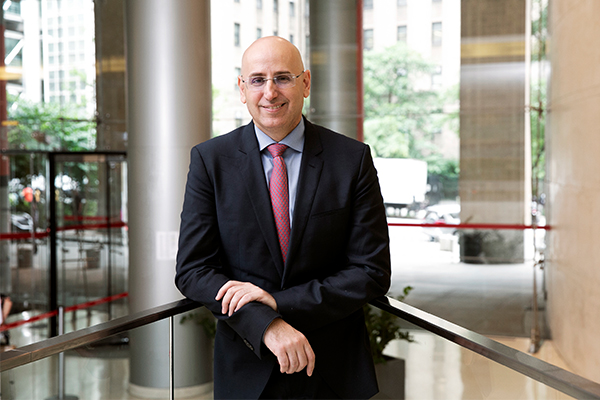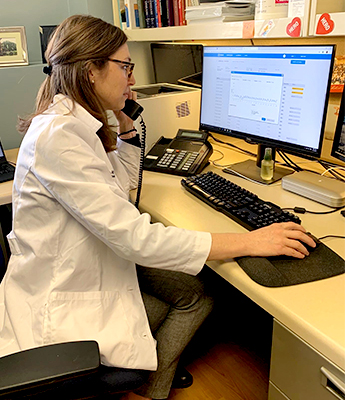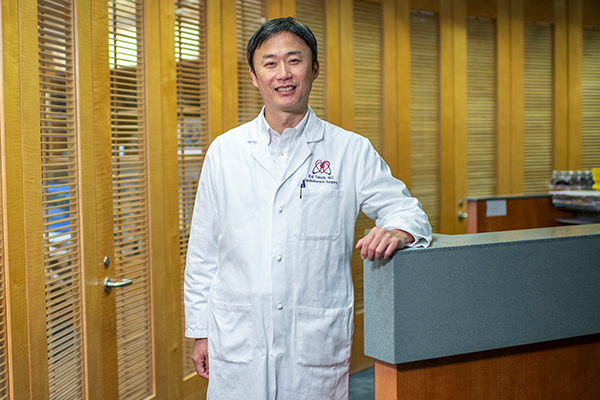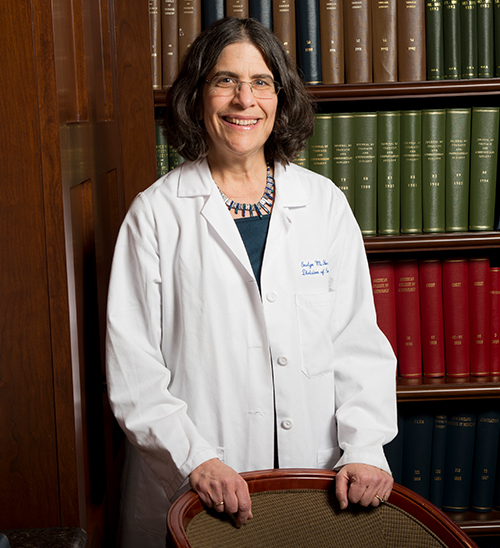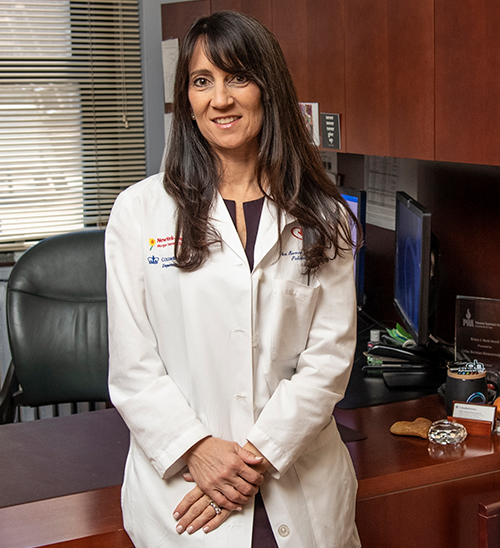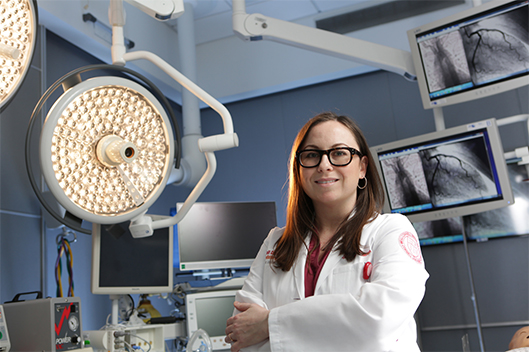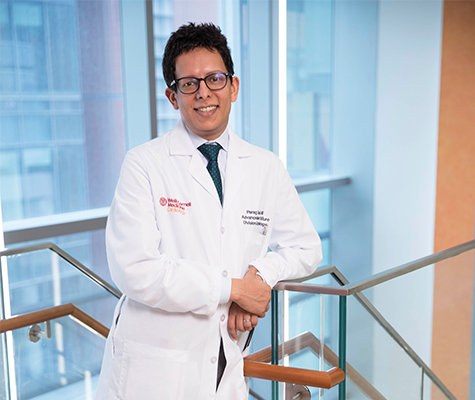Advanced Heart Failure: Pursuing Progress on Many Fronts
Dr. Nir Uriel
“Unfortunately, more and more patients are suffering from heart failure, and not every patient is able to access the level of care they need,” says Nir Uriel, MD, an internationally recognized physician-scientist and Director of Advanced Heart Failure, Cardiac Transplantation and Mechanical Circulatory Support Programs at NewYork-Presbyterian.
“There are options today that can help improve quality of life and increase longevity. Our goal is to reach as many of these patients as possible, regardless of where they live or their means, and provide them with the most advanced care so that they can enjoy life and have more time with their families and loved ones.” — Dr. Nir Uriel
Dr. Uriel oversees heart failure programs at NewYork-Presbyterian’s campuses in Manhattan, Queens, Brooklyn, and Westchester, with a goal to increase accessibility of care for those with advanced heart failure throughout New York and the surrounding regions. The expanded program builds on an initiative begun in 2017 to standardize care for patients with heart failure across all the campuses of NewYork-Presbyterian.
“We created a uniform pathway for the treatment of heart failure, which is applied at every NewYork-Presbyterian hospital,” says Gabriel T. Sayer, MD, Medical Director, Adult Heart Transplant Program at NewYork-Presbyterian/
Centralized Remote Heart Failure Management Program
Dr. Kelly Axsom
The Centralized Remote Heart Failure Management Program partners with local cardiology teams to manage patients with symptomatic heart failure remotely at home using the latest physiologic-based monitoring systems — remote patient monitoring, CardioMEMS™ and HeartLogic™.
Some patients will receive a remote patient monitoring kit, which contains a Bluetooth enabled blood pressure cuff, scale and pulse oximeter. Patients upload their measurements daily to the medical record, which are seen by their care team for intervention as needed.
The CardioMEMS system provides real-time notification of changes in the patient’s clinical status and access to secure data for proactive patient management. This system uses a small sensor to remotely monitor pulmonary artery pressure and will indicate yuid retention in the lungs caused by worsening heart failure. The sensor is permanently implanted in the distal pulmonary artery via a right heart catheterization procedure.
HeartLogic is the first FDA-approved heart failure diagnostic and monitoring tool that uses multiple sensors to track physiological trends, including heart rate and heart sounds, thoracic impedance, respiration, and activity level, and combines them into a single composite index. NewYork-Presbyterian’s heart failure cardiologists and physician assistants are applying this evidence-based technology and heart failure protocols to prevent decompensation and readmission to the hospital and improve clinical outcomes for each patient.
“Patient-initiated sensor readings are taken daily from the patient’s home and wirelessly transmitted to a secure website for clinicians to access and review,” says Kelly M. Axsom, MD, Medical Director of the Centralized Heart Failure Management Program. “The heart failure teams can then determine if the patient’s heart failure is worsening, often prior to a patient experiencing symptoms, and if intervention, medication adjustment, or other treatment changes are required.”
Advancing Advance Heart Failure
As a premier heart failure center, NewYork-Presbyterian has one of the biggest advanced heart failure programs in the country. “In 2021 our program performed 148 adults heart replacement therapy, 79 heart transplant and 69 left ventricular assist device with outstanding outcome,” said Dr. Uriel.
“Our program has a long history with great success over many years performing heart transplantation and multi-organ transplants such as heart-kidney, heart-liver, and heart-lung transplantation.”
Dr. Koji Takeda
“2022 marks the 45th year of our heart transplant program,” says Koji Takeda, MD, PhD, Surgical Director of Heart Transplantation and Mechanical Support, Surgical Director of the Adult Extracorporeal Membrane Oxygenation Program, and Director of the Pulmonary Thromboendarterectomy Program at NewYork-Presbyterian/Columbia. “We’ve performed more than 2,800 heart transplants to date. In 2021, our one year survival rate was 97.2 percent which was way above the national average of 91.7 percent.” (Source: SRTR – Scientific Registry of Transplant Recipients)
NewYork-Presbyterian’s heart transplant specialists continue to pursue improvements in treatment protocols for high-risk transplant populations and define new approaches to increase heart transplantation as a treatment option for patients in end-stage heart failure. Our program is working to expand the pool of heart donors using hepatitis C viremic donors increasing the availability of heart transplantation for those patients with longer waiting times on the list. A course of anti-viral therapy is administered at 12 weeks after transplant to cure the transmitted hepatitis C virus. Furthermore, we are able to use OCS Transmedics devices to expend our reach and performed DCD (Donation following Circulatory Death) to further expend the donor availability.
“Here, at the NewYork-Presbyterian we are trying to see how we can transplant patients who are considered to be too high risk for heart transplantation in other programs,” says Gabriel T. Sayer, MD. “Patients with a high level of antibodies who, historically, couldn’t receive heart transplantation, are being transplanted at NewYork-Presbyterian/Columbia following novel desensitization protocols, and the use of eculizumab, a new medication that allows us to overcome these immunological challenges. Furthermore, we were a pioneering center in transplanting HIV patients, and our research demonstrated that this group of patients does not carry a higher risk and should be eligible for advanced therapies.
A Landmark Change for LVADs
NewYork-Presbyterian offers one of the largest and most innovative ventricular assist device (LVAD) programs in the nation. The program led the original study to assess LVADs in patients with advanced heart failure who were not candidates for heart transplantation (the REMATCH study). In addition, Dr. Uriel serves as the National Co-Principle Investigator to the seminal MOMENTUM 3 study, the largest randomized trial in the history of mechanical circulatory support, assessing the use of the HeartMate 3™ LVAD in patients with advanced heart failure, which led to the approval of the device.
“NewYork-Presbyterian/Columbia surgeons and cardiologists were among the first nationwide to offer patients access to HeartMate 3 and enrolled the largest number of patients into the trial,” adds Yoshifumi Naka, MD, PhD, Surgical Director, Heart Failure, Heart Transplantation and Mechanical Circulatory Support at NewYork-Presbyterian Hospital. “The HeartMate 3 pump proved to be superior to previous LVADs as it eliminates the risk of pump thrombosis and dramatically reduces the risk of stroke.” Currently, The MCS team at NewYork-Presbyterian is leading the ARIES study to assess the use of aspirin during LVAD support, and the SWIFT study to evaluate the safety of minimal implantation of LVAD.
Addressing Clinical Challenges
Dr. Evelyn M. Horn
Dr. Erika S. Berman Rosenzweig
Pulmonary hypertension is present in about one-third of patients with heart failure and complicates the management of this disease. “In many cases, right heart failure follows left heart failure, but management of diffcult cases requires a special expertise and understanding of the interdependence of the right and the left ventricles,” says Evelyn M. Horn, MD, Director of Heart Failure and Pulmonary Hypertension at the Perkin Heart Failure Center at NewYork-Presbyterian/
“Pulmonary Hypertension is a complex, chronic disease with many different causes and treatments,” says Jennifer Haythe, MD, Director of the Adult Pulmonary Hypertension Program, and Director of the Cardio-Obstetrics program, NewYork-Presbyterian/
The pulmonary hypertension programs led by Erika S. Berman Rosenzweig, MD, Director of Pulmonary Hypertension, NewYork-Presbyterian/
“The PVDOMICS study includes all spectrums of pulmonary hypertension, including patients with heart failure. We are nearing the target of our initial enrollment and will be arranging for follow-up on these patients,” says Dr. Horn. “The program will augment the current classification based on shared biological features of 1,500 participants that place them at increased risk of developing pulmonary hypertension.”
“By systemically characterizing pulmonary hypertension patients utilizing clinical, biochemical, imaging, and physiological and pathological assessments, combined with genomic and RNA technology, we can improve our mechanistic and pathobiological understanding of the pulmonary vascular disease process,” says Dr. Berman Rosenzweig. “The goal is to be able to better target the right patient for the right therapeutic intervention.”
Mastering the Art of Managing Cardiogenic Shock
In the contemporary era, Extracorporeal Membrane Oxygenation (ECMO) is a mandatory tool to take care of patients with heart failure and pulmonary hypertension. The Adult ECMO Program at NewYork-Presbyterian/
“With our knowledge and experience, our program can provide the best care and the best outcomes to patients with heart failure and pulmonary hypertension,” says Koji Takeda, MD, PhD. Dr. Takeda’s expertise intersects with all phases of heart failure care, including pulmonary thromboendarterectomy (PTE), a challenging and complex procedure to address chronic thromboembolic pulmonary hypertension. “This a chronic condition in which patients develop pulmonary hypertension that can become life-threatening. PTE has been shown to be the best treatment in extending a patient’s survival,” says Dr. Takeda, who leads one of the largest programs in the country for this highly specialized surgery. “When we remove the obstructing thromboembolic material, symptoms such as shortness of breath, edema, and fatigue dramatically improve. But it requires careful patient selection, a surgical skill set, and a high level of postoperative medical care and management.”
Dr. Erin M. Iannacone
NewYork-Presbyterian/
Having trained in PTE surgery at the busiest program in the world, Dr. Iannacone knows that a thorough preoperative evaluation by the heart failure team and meticulous postoperative care are the keys to success. “Patients can benefit tremendously from PTE surgery but a successful operation is just the beginning,” she says. “Ongoing communication between the heart failure and surgical teams reassures the patients and their families that they are receiving the most up-to-date, innovative therapies long after their operation is completed.”
Heart Failure with Preserved Ejection Fraction
Dr. Parag Goyal
“The expansion of the advanced heart failure entity across NewYork-Presbyterian comes at a time when we are growing additional heart failure services, such as the Heart Failure with Preserved Ejection Fraction – HFpEF – program,” says Dr. Horn. “Our HFpEF program is the first and only subspecialty program in New York dedicated to this unique subtype of heart failure. Patients with HFpEF, also known as diastolic heart failure, develop heart failure symptoms, such as fatigue and shortness of breath, despite normal heart pump function.” The HFpEF program, led by Parag Goyal, MD, MSc, Director of the Heart Failure with Preserved Ejection Fraction Program, NewYork-Presbyterian/Weill Cornell, combines treatment options with research in order to improve the care of this vulnerable population.
Cardiac Amyloidosis
NewYork-Presbyterian/Columbia is the home for one of the largest cardiac amyloidosis programs in the tri-state area. The program offers novel therapies to cardiac amyloidosis patients in different phases of the disease, including heart transplantation. “Currently, we are conducting four phase 3 studies of novel therapies for cardiac amyloid patients,” says Mathew Maurer, MD, Director of the Cardiac Amyloid Program at NewYork-Presbyterian/
The heart failure groups also have established a strong collaboration with the cancer centers at both NewYork-Presbyterian/
For more information
Heart Failure and Transplantation Program
Milstein Family Heart Center
Heart Failure Program
Ronald O. Perelman Heart Institute



